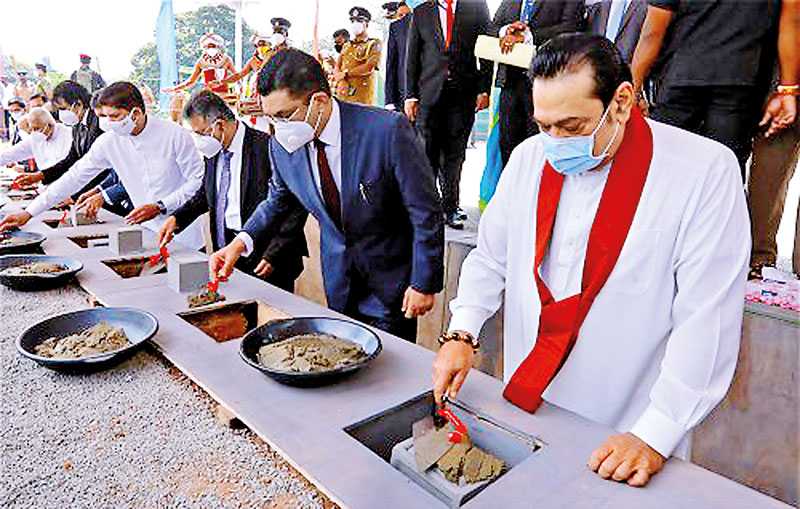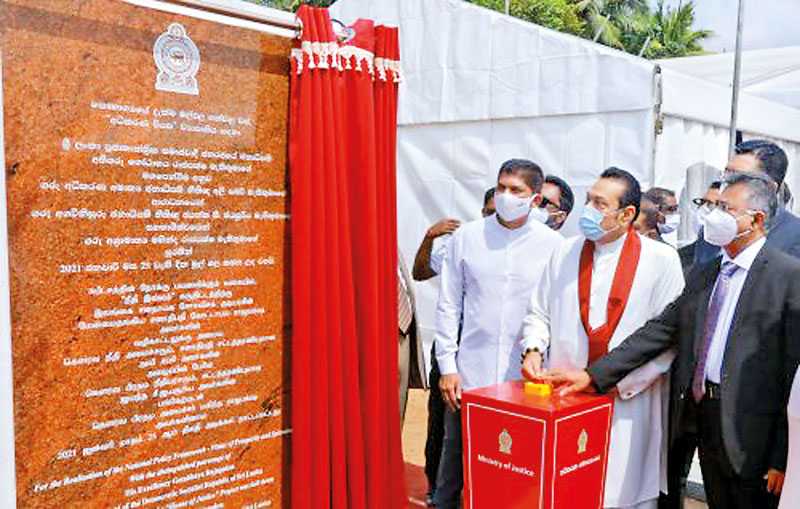Saturday Feb 21, 2026
Saturday Feb 21, 2026
Thursday, 28 January 2021 00:33 - - {{hitsCtrl.values.hits}}

Prime Minister Mahinda Rajapaksa laying the foundation stone for the construction of the new court complex ‘Adhikarana Piyasa’
|
Prime Minister Mahinda Rajapaksa addressing the gathering
|
Prime Minister Mahinda Rajapaksa early this week said that he believes the judicial courts should become a refuge for people searching for the justice and fairness from the law.
The Prime Minister said the Government had initiated building the national interest for one country, one law and pointed out that in order to avoid legal delays and resolve disputes in an efficient manner, all of us, the Judiciary, lawyers and the public, must step out of obsolete methods and change attitudes.
Prime Minister Mahinda Rajapaksa expressed these views after laying the foundation stone for the construction of the new court complex ‘Adhikarana Piyasa’ under the theme of vision of prosperity to Pride of Justice (Adhikarana Abhimanayata).
The new court complex, which will replace the court buildings in Hulftsdorp built during the colonial era, will become the biggest building complex of the Judiciary. The new complex spread in a land extent of six acres and will be completed in four stages in three years. The total estimated cost of the project will be Rs. 16.5 billion.
In the ‘Adhikarana Piyasa’ complex, 12 magistrate courts, eight high courts and four commercial high courts as well as 10 district courts, 10 official residences for judges and 110 official residences for courts’ staff are included.
Laying the foundation stone to the building took place Monday under the Prime Minister Mahinda Rajapaksa on the invitation of Minister of Justice Ali Sabry amid the religious observances of all faiths.
Addressing the gathering after laying the foundation stone for the court complex and unveiling the plaque, Prime Minister Mahinda Rajapaksa said the Judiciary is a basic requirement of a country and what the people want is fulfillment of the reforms presented by them. He added that the people has same kind of expectations with regard to the Judiciary as well.
“When we came to power we put before the country a series of proposals that could fulfill the aspirations of the people. We received the blessings of the people for that. The general public of the country wanted to see the reforms that we proposed be implemented. There is a similar belief for the Judiciary. Sovereignty rests with the people of the country, regardless of our political views. Therefore, you are aware that the policies and reforms that we place before the country are judged by them.
“Every time we came to power in history we worked to protect the independence of the Judiciary. We never tried to bend the law through personal interference. Therefore, you are aware that we have drawn the attention of the people to formulate a constitutional amendment that protects the sovereignty of the country and the people, national security, economic development covering all, human rights and the rule of law. Arrangements are already being made to draft it.
“Needless to say, the people of our country are still suffering from outdated laws, procedures and ordinances. It is our responsibility to liberate the people from this pressure.”
The Prime Minister pointed out that instead of taking the existing civil disputes to court, they should be resolved within the conciliation boards.
Also, delays in trials have become a huge burden to the people, the Premier said adding that some people will spend entire life in courts to resolve disputes but will die prematurely without seeing a verdict.
“After discussing the dilapidated condition of the Hulftsdorp buildings in Colombo, no solution was proposed. Today we have come up with a permanent solution. I remember we talked about this in 2014. We wanted to start then. With the change of government, they faltered. But today I am happy to be able to start this.
“The Minister of Justice is taking steps to establish 100 new courtrooms throughout the country in parallel to the new building complex that will be inaugurated today. We believe that when the infrastructure of the Judiciary is developed in this manner, cases can be expedited and delays avoided. That is why this is the beginning of a historic step.
“We know that trials are already taking place through video technology. That facility was also given to some prisons. But our goal is to digitalise the entire judicial system. The Minister is keen to commence that work from next February. We hope that this will increase the efficiency of the Judiciary several times.
“Physical development alone will not improve the Judiciary. You know that. For that human resource development is required. We hope to expand local and foreign study facilities related to the legal field. We also focus on their facilities. We hope to give priority to this in the courts starting today.
“We feel that in order for the dispute resolution system to be effective in resolving the law and preventing legal delays, we, the stakeholders, the Judiciary, the lawyers and the public, all need to step out of the outdated system and change attitudes.
“In the last 40 years, the number of judges in the Supreme Court has increased by 60%. I believe it is a victory for the country. We believe that the number of such judges should be further increased. I think the Minister also mentioned about it.
“We have always believed that the law should be equal for all, and that the citizen should be law abiding. On the other hand, citizens receiving the services of the Judiciary should not be afraid of those institutions.
“It is true that these reforms could not be completed overnight. People including you have understood that truth. Therefore, we are at the forefront of building the national interest for one country, one law. I hope that all in this field, including you, will support the updating of a suitable legal framework for this purpose before the country.”

The new court complex, which will replace the court buildings in Hulftsdorp built during the colonial era, will become the biggest building complex of the Judiciary